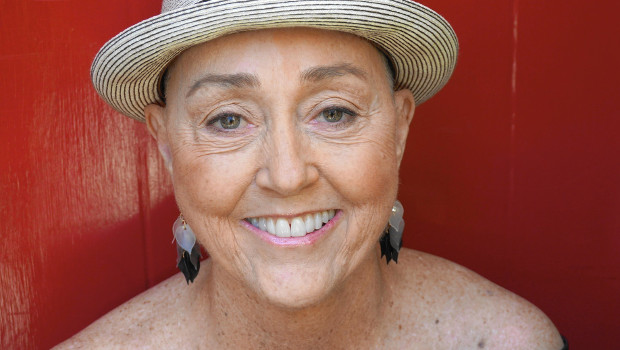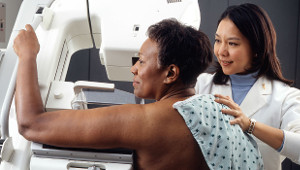Applying computer power to cancer research

The late Laurie Becklund. Photographed by Elizabeth Rose Becklund Weinstein.
Before journalist Laurie Becklund died, she called for Big Data research on cancer. That’s exactly what the Breast Cancer Surveillance Consortium does.
Last February, the journalist and author Laurie Becklund died of metastatic breast cancer after 19 years with the disease. In her last published article, “As I lay dying,” she begged that no one say she died “fighting” breast cancer, since it implied she must have been weak to lose the battle and that the fight, as she put it, “was ever fair.”
Laurie was initially diagnosed at the young age of 47 with a type of cancer that most women survive, but she was correct that the disease isn’t fair. While women who have risk factors like older age and being overweight are more likely to be diagnosed with breast cancer, women who are young and have a normal body mass index can still get it. Researchers continue to plug away, trying to learn what causes breast cancer, how best to diagnose it, why some cancers spread and others don’t, how to treat it (it’s becoming clear that breast cancer is not one disease), and how to avoid finding something that turns out not to be dangerous—also known as overdiagnosis.
Mammograms are the most obvious tool to find cancers. But they didn’t help Laurie. By the time she was diagnosed she’d had over 20 mammograms—none of which detected her cancer (she found the lump on her own). On the flip side, millions of women each year have the opposite problem: a mammogram finds something suspicious when it turns out to be nothing. In the meantime, these women may deal with additional doctor visits, tests and biopsies, not to mention the terror of thinking they have cancer.
What is needed, Laurie argued, is to harness the power of today’s super computers to answer women’s questions about metastatic breast cancer.
“In the Big Data-era, this void is criminal,” she wrote. “Consider what Wall Street does. Even the tiniest companies can see how much stock they sell, compare themselves to cohorts, review history, predict trends. Why can't we create such a database for cancer patients, so we can all learn from patient experiences and make more educated decisions on what treatments will extend and improve lives?”
We’re close to Laurie’s Big Data vision
Right now, the largest breast cancer screening database in the country, collected by the Breast Cancer Surveillance Consortium (BCSC), is housed at Group Health Research Institute. It doesn’t fulfill Laurie’s vision of an “open, online, broad-range database about patient histories that will provide information invaluable to those who've been given a death sentence.” But it does provide important data to the public (primarily researchers) to study what affects a woman’s risk of getting breast cancer, and which screening strategies are right for which women.
While Laurie specifically wanted a database with information on metastatic breast cancer so that patients like her could learn what treatments did and didn’t work, a large database like the BCSC can do many other things. For example, BCSC studies have shown that:
- Having dense breasts increases a woman’s risk of getting breast cancer and can hide tumors, making it difficult to find them on mammograms.
- For some women, screening every other year might be as effective as screening every year, and it would reduce harms.
- Breast implants make it harder to read mammograms accurately.
Laurie’s article states, “I demanded the truth, always, from my doctors,” and she was right that giving women more information is powerful. A recent study, published in the journal Lancet, found that when women were given more information about overdetection they were less likely to get a mammogram, possibly reducing harms. In other words, when women were better informed, they made different choices.
Laurie may not have lived to see what she wanted, but we shouldn’t let her dream die with her.
by Casey Luce, MSPH
Casey Luce is a project manager at Group Health Research Institute.
Breast Cancer Surveillance Consortium
BCSC is a research resource for studies designed to assess the delivery and quality of breast cancer screening and related patient outcomes in the United States.




